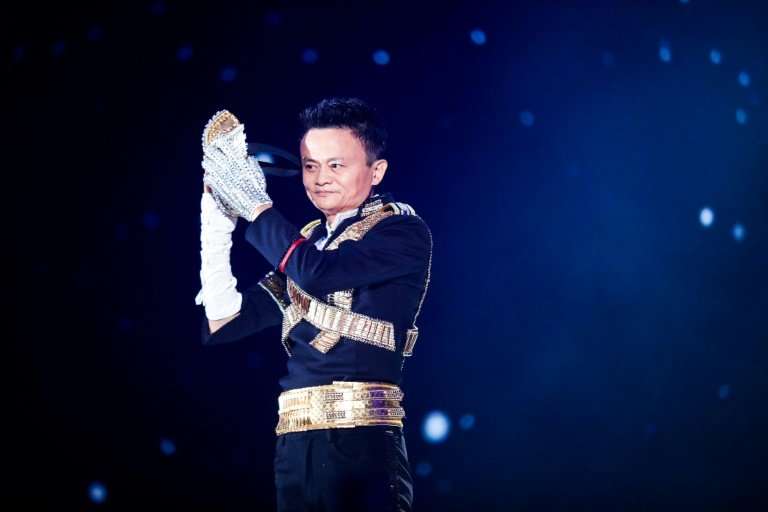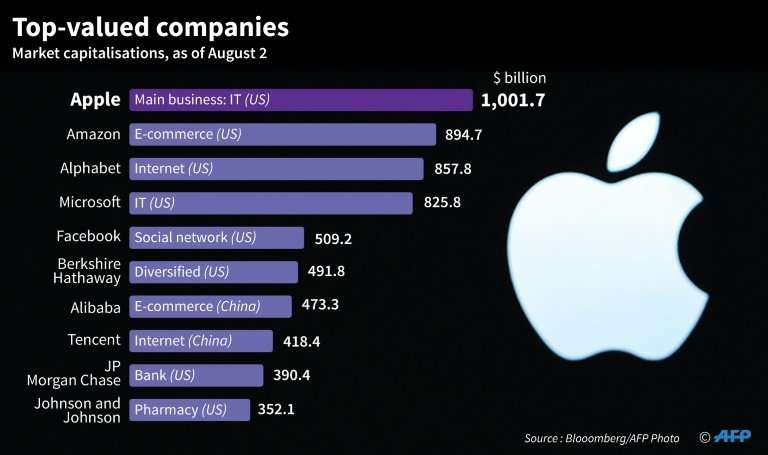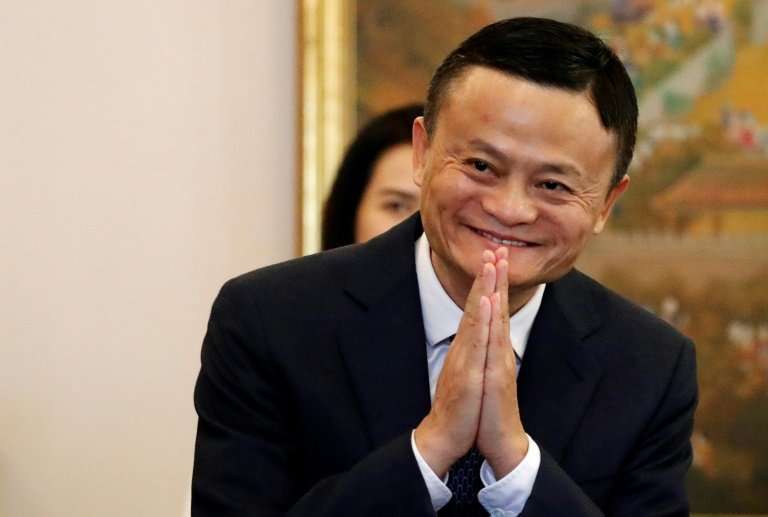Jack Ma, chairman of Alibaba group, has told the New York Times he plans to retire on Monday
Alibaba's charismatic co-founder and chairman Jack Ma plans to retire from the Chinese e-commerce giant on Monday to devote his time to philanthropy focused on education, he told the New York Times in an interview.
Ma was an English teacher before starting Alibaba in 1999 and built it into a multibillion-dollar internet colossus, becoming one of the world's richest men and a revered figure in his homeland.
His own worth has soared along with that of the company, which has added cloud computing, films and e-payments to its growing portfolio and was valued at $420.8 billion when the stock market closed on Friday.
Ma told The New York Times that he plans to step down from the company on Monday—his 54th birthday—referring to his departure as "the beginning of an era" rather than an end.
Ma, who gave up the title of CEO in 2013, said he now planned to devote his time and fortune to education. He is among China's richest men with a net worth of around $40 billion, according to the Bloomberg Billionaires Index.
The way he chose to make the announcement was unusual. The New York Times is blocked in China by Communist Party censors and there was no official statement from Alibaba on Saturday.
Alibaba's press office did not immediately respond to requests for comment. The firm posted a photo on social media on Saturday of Ma meeting with the chairman of the Moutai liquor company.
In an interview with Bloomberg TV released on Friday, Ma hinted at his retirement plans, saying he wanted to follow in the footsteps of Microsoft founder Bill Gates, one of the world's most prolific philanthropists.
"There's a lot of things I can learn from Bill Gates. I can never be as rich, but one thing I can do better is to retire earlier," he said.
"I think some day, and soon, I'll go back to teaching," he said, adding he had been preparing philanthropy plans at his eponymous foundation "for 10 years".
Chart showing top 10 companies based on market capitalisation, as of August 2.
Ma is part of a generation of billionaire entrepreneurs who made their fortunes as China embraced the digital age, creating some of the country's largest and most successful companies in the space of little more than a decade.
Huge conglomerates like Alibaba, Tencent, Baidu and JD.com are to China what Facebook and Google are to the United States.
Ma is the first of his generation of uber-wealthy tech bosses to retire, a rare move in a country where business figures often run their empires well into their 80s—Hong Kong tycoon Li Ka-shing only retired in May at the age of 89.
An accidental entrepreneur
Ma's rags-to-riches story is particularly remarkable.
Born into a poor family in Hangzhou, eastern Zhejiang province, Ma became a university teacher but gave the job up after discovering the internet.
After being knocked back by US venture capitalists in 1999, a cash-strapped Ma persuaded friends to give him $60,000 to start Alibaba, which operated out of an apartment in Hangzhou.
"The first time I used the internet, I touched on the keyboard and I find 'well, this is something I believe, it is something that is going to change the world and change China,'" Ma once told CNN.
The company, still headquartered in his hometown, initially allowed businesses to sell products to each other online but soon morphed into China's largest online retail market.
It transformed how Chinese people shop and pay for things, especially through the now ubiquitous Alipay digital payment service.
Alababa transformed how Chinese people shop and pay for goods
The Alibaba empire now spans well beyond online retail and payments to include cloud computing, digital media and entertainment, with sterling revenue growth that jumped another 61 percent in the quarter ending June 30.
Jackson Wong, associated director at Huarong International Securities, said Ma's departure appears "a little bit rushed" but it also shows he has confidence in the company's leadership.
"But his retirement will definitely affect the overall image of the company because when you think of Alibaba, you think of Jack Ma," Wong told AFP.
China regulations
Ma has inspired strong devotion among his employees and users, drawing comparisons with late Apple co-founder Steve Jobs—although he practised a more open management style.
A devotee of tai chi, he has made references to Chinese martial arts in both business strategy and corporate culture.
Chinese state media have burnished his rags-to-riches story, saying his parents were poorly educated and his father depended on a monthly retirement allowance of just $40 to support the family.
Ma's retirement comes after a torrid couple of weeks for his rival tech CEOs in China.
Richard Liu, the billionaire founder of Alibaba's main competitor JD.com, was briefly arrested in the US over a rape allegation last week. He was released and returned to China, although the investigation remains active.
Meanwhile internet and gaming giant Tencent, an e-payment rival, has seen its profits and share price drop amid an apparent regulatory squeeze on the tech giant's online gaming business.
Alibaba founder Jack Ma is venerated in China thanks to his remarkable rags to riches rise
Jack Ma: English teacher turned internet tycoon
Jack Ma was a cash-strapped Chinese entrepreneur and former English teacher when he convinced friends to give him $60,000 to start a Chinese e-commerce firm called Alibaba in 1999.
Almost two decades later, Alibaba is an internet juggernaut and Ma is among the world's richest men, with a net worth of more than $40 billion, according to the Bloomberg Billionaires Index.
But the company's chairman is now retiring, telling The New York Times that he plans to step down on Monday—his 54th birthday—to devote his time to philanthropy focused on education.
Alibaba Group includes Tmall.com for business-to-consumer transactions and Taobao, China's most popular online consumer marketplace with hundreds of millions of products and services listed.
The company has now become a player in online payments and films, and it has been pouring investment into an array of ventures, including bricks-and-mortar retail, cloud computing, meal delivery and advertising.
It owns a stake in China's hugely popular Twitter-like Weibo platform and in 2015 it bought the South China Morning Post newspaper.
Ma, whose Chinese name is Ma Yun, has often described himself as something on an accidental entrepreneur, giving up his university teaching for the hustle of trade after discovering the internet.
Seeing an opportunity for small businesses to buy and sell their goods online, he started Alibaba, initially running the company out of his apartment in the eastern city of Hangzhou, where the company's headquarters remains.
He has inspired strong devotion among his employees and users, drawing comparisons with late Apple co-founder Steve Jobs—although he practices a more open management style.
He is one of the most colourful of China's growing cop of billionaires, performing a Michael Jackson-inspired dance routine at the company's 18th anniversary celebration last year, and starring in his own kung fu short film.
He likes to recount his stories of rejection, such as the time he was turned down for a job at the KFC fast-food chain and being rejected by Harvard "10 times".
Ma's success was evident after Alibaba's Taobao bested eBay in China, forcing the US auction site to largely withdraw from the country in 2006.
He retired as Alibaba's chief executive in 2013, eventually handing the reins to his protege Daniel Zhang, but he remained active within the company, providing strategic direction as chairman.
Ma has long shown an admiration for Microsoft founder Bill Gates who has donated vast amounts of his wealth to philanthropic causes.
Like Gates he has created his own eponymous foundation—the Jack Ma Foundation—which he says will push his original calling: education.
"This is something I think I can do much better than being CEO of Alibaba," he told Bloomberg TV recently.
© 2018 AFP



























